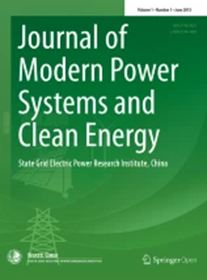A Flexibility Scheduling Method for Distribution Network Based on Robust Graph DRL Against State Adversarial Attacks
IF 6.1
1区 工程技术
Q1 ENGINEERING, ELECTRICAL & ELECTRONIC
Journal of Modern Power Systems and Clean Energy
Pub Date : 2024-11-15
DOI:10.35833/MPCE.2024.000409
引用次数: 0
Abstract
In the context of large-scale photovoltaic integration, flexibility scheduling is essential to ensure the secure and efficient operation of distribution networks (DNs). Recently, deep reinforcement learning (DRL) has been widely applied to scheduling problems. However, most methods neglect the vulnerability of DRL to state adversarial attacks such as load redistribution attacks, significantly undermining its security and reliability. To this end, a flexibility scheduling method is proposed based on robust graph DRL (RoGDRL). A flexibility gain improvement model considering temperature-dependent resistance is first proposed, which considers weather factors as additional variables to enhance the precision of flexibility analysis. Based on this, a state-adversarial two-player zero-sum Markov game (SA-TZMG) model is proposed, which converts the robust DRL scheduling problem into a Nash equilibrium problem. The proposed SA-TZMG model considers the physical constraints of state attacks that guarantee the maximal flexibility gain for the defender when confronted with the most sophisticated and stealthy attacker. A two-stage RoGDRL algorithm is proposed, which introduces the graph sample and aggregate (Graph-SAGE) driven soft actor-critic to capture the complex feature about the neighbors of nodes and their properties via inductive learning, thereby solving the Nash equilibrium policies more efficiently. Simulations based on the modified IEEE 123-bus system demonstrates the efficacy of the proposed method.基于鲁棒图DRL的配电网抗状态对抗柔性调度方法
在大规模光伏并网的背景下,灵活调度是保证配电网安全高效运行的关键。近年来,深度强化学习(DRL)被广泛应用于调度问题。然而,大多数方法都忽略了DRL易受状态对抗性攻击(如负载重分配攻击)的影响,严重影响了DRL的安全性和可靠性。为此,提出了一种基于鲁棒图DRL (RoGDRL)的柔性调度方法。为了提高柔性分析的精度,首先提出了考虑温度相关阻力的柔性增益改进模型,将天气因素作为附加变量考虑。在此基础上,提出了一种状态对抗的二人零和马尔可夫博弈(SA-TZMG)模型,将鲁棒DRL调度问题转化为纳什均衡问题。所提出的SA-TZMG模型考虑了状态攻击的物理约束,保证防御者在面对最复杂和最隐蔽的攻击者时获得最大的灵活性增益。提出了一种两阶段的RoGDRL算法,该算法引入了图样本和聚合(graph - sage)驱动的软actor-critic,通过归纳学习捕捉节点邻居及其属性的复杂特征,从而更有效地求解纳什均衡策略。基于改进的IEEE 123总线系统的仿真验证了该方法的有效性。
本文章由计算机程序翻译,如有差异,请以英文原文为准。
求助全文
约1分钟内获得全文
求助全文
来源期刊

Journal of Modern Power Systems and Clean Energy
ENGINEERING, ELECTRICAL & ELECTRONIC-
CiteScore
12.30
自引率
14.30%
发文量
97
审稿时长
13 weeks
期刊介绍:
Journal of Modern Power Systems and Clean Energy (MPCE), commencing from June, 2013, is a newly established, peer-reviewed and quarterly published journal in English. It is the first international power engineering journal originated in mainland China. MPCE publishes original papers, short letters and review articles in the field of modern power systems with focus on smart grid technology and renewable energy integration, etc.
 求助内容:
求助内容: 应助结果提醒方式:
应助结果提醒方式:


